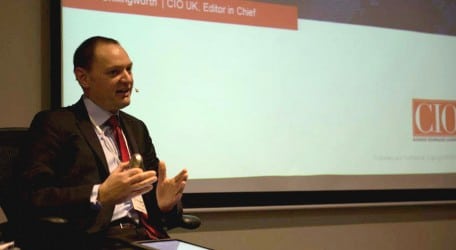
SmartCity Malta hosts ICT Malta conference
Pictured above: Mark Chillingworth, editor-in-chief of CIO magazine and cio.co.uk, addressing the ICT 2012 Malta conference, held last month at SmartCity Malta
New approaches to ICT were discussed at the ICT 2012 Malta conference, held last month at SmartCity Malta.
In his introduction, conference chairman David Spiteri Gingell, managing director of DSG Consulting Ltd, dwelt on the main conference discussion issues, cloud computing and the function of the chief information officer (CIO).
Cloud computing enables infrastructure to be minimised, yet there are legal issues related to the servers’ location, who owns the data and what happens when contracts break down.
The CIO’s role is now well established both in large businesses and in government entities, bridging the gap between the technology and the business. Yet CEOs often fail to understand this role and issues of capacity building mean few CIOs incorporate the best of ICT knowledge and that of the business.
The CIO’s role is key in managing the cloud computing environment.
Commenting on the conference, Suleiman Al Riyami of SmartCity Malta, said: “This one-of-a-kind event provided a practical outlook to new developments in the industry, and was held at SmartCity Malta – the ICT hub of the Mediterranean.”
“ICT Malta 2012 and SmartCity Malta created an ideal platform for such visionaries and influential professionals to have their ideas shared and discussed,” Mr Al Riyami added. “We aim to regularly create such exchanges at SmartCity Malta.”
Mark Chillingworth, editor-in-chief of CIO magazine and cio.co.uk, whose magazine publishes the top CIO 100 in the UK, said the most interesting CIOs are those who transform the business. CIOs and those in IT are no longer order takers but are pushing the technology. The CIO’s role is one of the most complicated, comparable to that of the CEO.
In the context of a changing world, where online sales are up by 5% and high street sales, in the midst of a recession, are down 1.5%, Denmark is rethinking its high streets into social areas where people are connected in a social setting.
Unilever’s CIO was asked to keep prices low, even if commodity prices were rising. Campaigns were decentralised and, using cloud computing, photography was made available to all companies within the group, saving money and ensuring more control over the brand.
Organisations face the challenge to analyse data, putting the ‘I’ back into CIO.
Consultant Joseph G. Woods sees the CIO as the driver of innovation. While IT is based on vertical or logical thinking, it was important to use lateral thinking skills to think outside the box and find different solutions.
Malta has great potential to act as a global test bed for innovation because of its geostrategic position and its small size, enabling it to change course quickly, acting fast to seize the moment. Since 1992 Malta had seen the number of ICT companies grow from 10 to over 600, employing some 6,000 people.
Malta could become a Broadband Regional Centre, providing consultancy, design and planning, programme management, installation and training. Rather than Research and Development, efforts must be focused on Research for Innovation.
The chairman of the IT Business Section at the Malta Chamber of Commerce, Enterprise and Industry, Keith Fearne, agreed that cloud computing did change the role of the IT Department. The harder question to answer was how.
He noted a shift in the balance towards cloud computing with business leaders feeling more comfortable. He predicted that by the end of this year 60% of existing enterprises would be using the cloud, which is being fired up by mobility.
Issues that would have to be faced included network resilience, security, data, device management and compliance. There was no ‘one size fits all’ solution. Cloud computing was ideal for micro enterprises. The bottom line was that it is always about economics but he urged: Don’t resist the wave. Ride it.
Steve Casaletto of the KEY IT Group argued that the focus in IT has been on back-ups when it should be on Business Continuity Management. The technology of cloud computing has been around for a long time, it is just the title that has changed.
BCM follows a holistic process and, thanks to the affordability of cloud computing, BCM is now more within reach.
Dr Nicholas Sammut, CEO, Malta Science and Technology Institute, tackled Research and Innovation Governance in ICT.
For more information and event images visit www.leadevents.com.mt.
- January 23, 2013 No comments Posted in: Events





